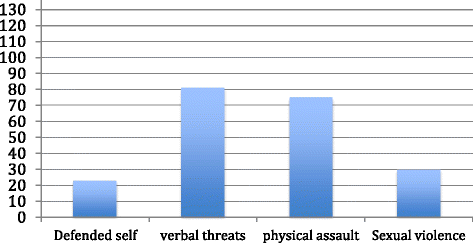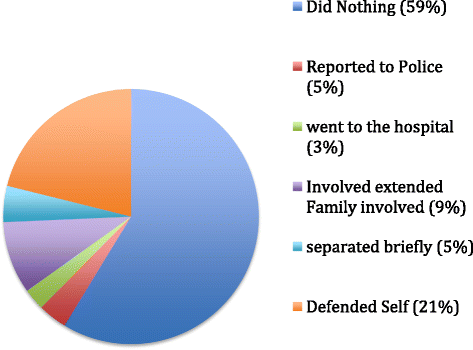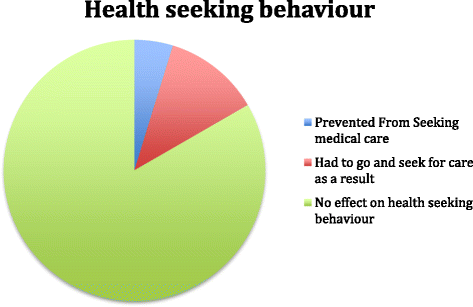Burden of intimate partner violence in The Gambia - a cross sectional study of pregnant women
- PMID: 25895955
- PMCID: PMC4405825
- DOI: 10.1186/s12978-015-0023-x
Burden of intimate partner violence in The Gambia - a cross sectional study of pregnant women
Abstract
Background: Intimate partner violence is an important public health problem that cuts across geographic and cultural barriers. Intimate partner violence refers to the range of sexually, psychologically and physically coercive acts used against women by current or former male intimate partners. The frequency and severity of violence varies greatly but the main goal is usually to control the victims through fear and intimidation. About 80% of Gambian women believe it is acceptable for a man to beat his wife thus encouraging the perpetuation of violence against women. The objective was to ascertain the burden of intimate partner violence amongst pregnant women in Gambia.
Methods: A cross sectional survey was carried out at Edward Francis Small Teaching Hospital, Banjul, The Gambia, on antenatal clinic attendees between October and December 2012, using a pre-tested structured interviewer administered questionnaire. All pregnant women were informed about the study at the antenatal booking clinic. Of the 161 pregnant women informed, 136 (84.5%) consented to take part and were recruited in the study. Descriptive analysis was done using the Epi info statistical software. Any pregnant woman booking for the first time during the period of the study was eligible to be recruited into the study.
Results: Majority of enrolled participants (61.8%) reported intimate partner violence. Verbal forms of intimate partner violence were the commonest forms, with 12% requiring medical care on account of intimate partner violence and 3% prevented from seeking healthcare as a result of such violence.
Conclusion: Intimate partner violence is common in The Gambia, West Africa and is a threat to women's health.
Figures
Similar articles
-
Factors Associated With the Chronicity of Intimate Partner Violence Experiences Among Pregnant Women in Detoxification Services.Women Health. 2015;55(8):883-99. doi: 10.1080/03630242.2015.1061090. Epub 2015 Jun 18. Women Health. 2015. PMID: 26086380
-
Intimate partner violence among pregnant women attending antenatal care services in the rural Gambia.PLoS One. 2021 Aug 5;16(8):e0255723. doi: 10.1371/journal.pone.0255723. eCollection 2021. PLoS One. 2021. PMID: 34352019 Free PMC article.
-
Is there an association between pregnant women's experience of violence and their partner's drinking? A Swedish population-based study.Midwifery. 2019 Feb;69:84-91. doi: 10.1016/j.midw.2018.10.019. Epub 2018 Oct 30. Midwifery. 2019. PMID: 30415105
-
Intimate partner violence: prevalence, health consequences, and intervention.Med Clin North Am. 2015 May;99(3):629-49. doi: 10.1016/j.mcna.2015.01.012. Epub 2015 Mar 6. Med Clin North Am. 2015. PMID: 25841604 Review.
-
Intimate partner violence: new directions.Ann N Y Acad Sci. 2006 Nov;1087:121-41. doi: 10.1196/annals.1385.011. Ann N Y Acad Sci. 2006. PMID: 17189502 Review.
Cited by
-
Social and Cultural Factors Affecting Maternal Health in Rural Gambia: An Exploratory Qualitative Study.PLoS One. 2016 Sep 23;11(9):e0163653. doi: 10.1371/journal.pone.0163653. eCollection 2016. PLoS One. 2016. PMID: 27661617 Free PMC article.
-
Intimate partner violence among young women in Ibadan, Nigeria: are there slum and non-slum differences?BMC Womens Health. 2023 May 27;23(1):290. doi: 10.1186/s12905-023-02446-5. BMC Womens Health. 2023. PMID: 37244999 Free PMC article.
-
Intimate Partner Violence, Human Rights Violations, and HIV among Women in Nairobi, Kenya.Health Hum Rights. 2020 Dec;22(2):155-166. Health Hum Rights. 2020. PMID: 33390704 Free PMC article.
-
Perceived social support and the experience of intimate partner violence among married and cohabiting young women in urban slums, Ibadan, Nigeria: a descriptive study.BMJ Public Health. 2024 Jan 8;2(1):e000425. doi: 10.1136/bmjph-2023-000425. eCollection 2024 Jun. BMJ Public Health. 2024. PMID: 40018111 Free PMC article.
-
Perceptions of women towards screening for intimate partner violence.Afr J Prim Health Care Fam Med. 2022 Sep 14;14(1):e1-e8. doi: 10.4102/phcfm.v14i1.3527. Afr J Prim Health Care Fam Med. 2022. PMID: 36226931 Free PMC article.
References
-
- World Health Organization. WHO/WHD Violence against women: a priority health issue. Geneva: World Health Organization, 1997. WHO document WHO/FRH/WHD/97.8♯
-
- Heisev L, Ellsberg M, Gottemoeller M. Ending Violence Against Women. Population Reports, Series L, No. 11. Baltimore, Johns Hopkins University School of Public Health: Population Information Program; 1999.
-
- World Health Organization. WHO/PATH Researching Violence Against women – a practical guide for researchers and activists. www.path.org/publications/files/GBV_rvaw_complete.pdf Accessed 28 October 2013
-
- Campbell DW, Sharps PW, Gary FA, Campbell JC, Lopez LM. Intimate Partner Violence in African American Women. Online J Issues Nurs. 2002;7(1):5. - PubMed
-
- Boy A, Salihu HM. Intimate Partner Violence and birth outcomes: A systematic review. Int J Fertil Womens Med. 2004;49(4):159–64. - PubMed
MeSH terms
LinkOut - more resources
Full Text Sources
Other Literature Sources
Medical




